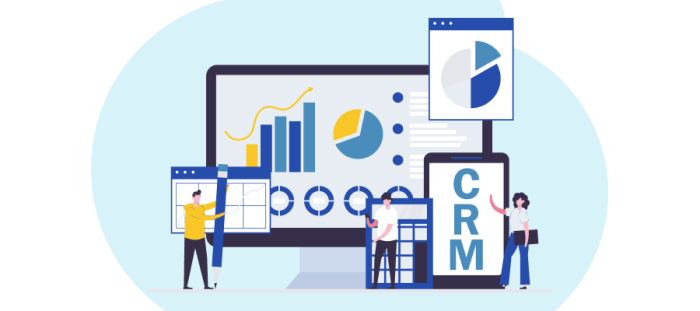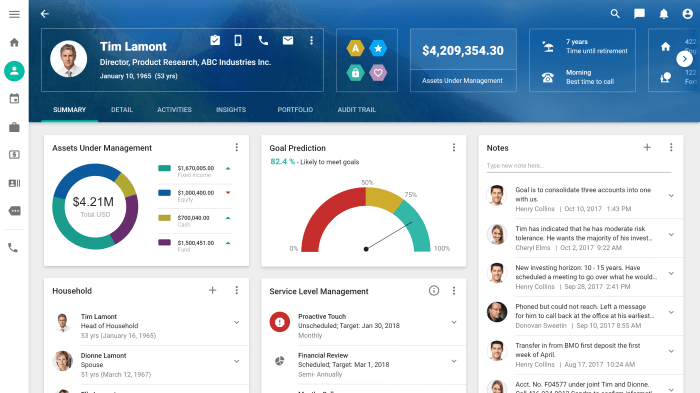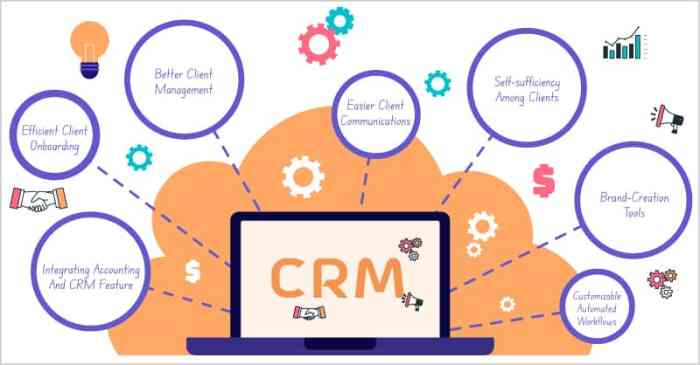Crm software for financial services – The financial services industry operates in a highly competitive and regulated environment. Building and maintaining strong client relationships is paramount for success. Customer Relationship Management (CRM) software has become an indispensable tool for financial institutions of all sizes, enabling them to streamline operations, improve client service, and ultimately drive revenue growth. This comprehensive guide explores the crucial role of CRM in financial services, detailing its features, benefits, and considerations for implementation.
Understanding the Unique Needs of Financial Services CRM
Financial services CRM differs significantly from CRM solutions used in other industries. The sector’s stringent regulatory compliance requirements, the need for robust security measures to protect sensitive client data (like PII, financial information, and transaction history), and the importance of personalized, high-touch client interactions necessitate specialized CRM software. A standard CRM simply won’t suffice. Key differentiators include:
Data Security and Compliance
Financial institutions must adhere to regulations like GDPR, CCPA, and industry-specific rules (e.g., FINRA for broker-dealers in the US). A financial services CRM must be designed with robust security features, including data encryption, access controls, and audit trails, to ensure compliance and protect client data from breaches. Features like multi-factor authentication and data masking are crucial.
Personalized Client Interaction
High-net-worth individuals and sophisticated investors expect a personalized and proactive service experience. A financial services CRM should facilitate personalized communication, tailored product recommendations, and efficient management of client portfolios. Integration with other systems, such as portfolio management software and wealth management platforms, is essential for a seamless client experience.
Workflow Automation and Efficiency
Financial advisors and wealth managers often juggle multiple clients and tasks. A CRM can automate repetitive processes, such as client onboarding, reporting, and regulatory compliance tasks, freeing up valuable time for relationship building and strategic planning. Automated workflows can significantly improve operational efficiency and reduce administrative overhead.
Regulatory Reporting and Compliance, Crm software for financial services
The ability to generate accurate and timely reports for regulatory compliance is critical. A robust financial services CRM should provide tools for generating compliance reports, tracking client interactions, and managing regulatory communications, ensuring adherence to all relevant rules and regulations.
Key Features of a Financial Services CRM
Effective CRM software for financial services incorporates several essential features:

Source: velvetech.com
- Client Relationship Management: Centralized database of client information, including contact details, financial history, investment preferences, and interaction history.
- Lead Management: Tools to capture, qualify, and nurture leads, tracking their progress through the sales pipeline.
- Sales Force Automation: Automation of sales processes, such as contact management, opportunity tracking, and sales forecasting.
- Marketing Automation: Automated marketing campaigns, personalized email marketing, and targeted advertising to nurture leads and engage existing clients.
- Customer Service Management: Tools for managing client inquiries, resolving issues, and tracking customer satisfaction.
- Reporting and Analytics: Comprehensive reporting and analytics dashboards to track key performance indicators (KPIs) and gain insights into client behavior and business performance.
- Integration Capabilities: Seamless integration with other financial systems, such as portfolio management software, accounting software, and compliance platforms.
- Security and Compliance: Robust security features to protect sensitive client data and ensure compliance with relevant regulations.
- Mobile Accessibility: Access to client information and CRM functionalities from mobile devices for on-the-go access.
Benefits of Implementing a Financial Services CRM: Crm Software For Financial Services
Investing in a robust CRM system offers numerous advantages for financial institutions:
- Improved Client Relationships: Personalized interactions, proactive service, and efficient communication foster stronger client relationships and enhance loyalty.
- Increased Sales and Revenue: Effective lead management, targeted marketing, and streamlined sales processes drive revenue growth.
- Enhanced Operational Efficiency: Automation of repetitive tasks frees up time for strategic initiatives and improves overall productivity.
- Better Compliance: Automated compliance checks and reporting reduce the risk of regulatory violations and minimize penalties.
- Improved Data Management: Centralized client data provides a single source of truth, improving data accuracy and consistency.
- Data-Driven Decision Making: Comprehensive reporting and analytics provide insights to inform strategic decisions and optimize business performance.
- Increased Profitability: Improved efficiency, reduced costs, and increased revenue contribute to enhanced profitability.
Choosing the Right CRM for Your Financial Institution
Selecting the right CRM involves careful consideration of several factors:
- Size and Complexity of Your Institution: Choose a CRM that scales with your growth and meets your specific needs.
- Budget Constraints: Consider the cost of the software, implementation, and ongoing maintenance.
- Integration Requirements: Ensure the CRM integrates seamlessly with your existing systems.
- Regulatory Compliance: Verify that the CRM meets all relevant regulatory requirements.
- User-Friendliness: Choose a CRM that is intuitive and easy for your staff to use.
- Vendor Support: Select a vendor that provides reliable technical support and ongoing training.
Frequently Asked Questions (FAQ)
- Q: What is the cost of financial services CRM software? A: The cost varies greatly depending on the vendor, features, and number of users. Expect a range from a few hundred dollars per month to tens of thousands of dollars per year for enterprise-level solutions.
- Q: How long does it take to implement a financial services CRM? A: Implementation time depends on the complexity of the system and the size of your institution. It can range from a few weeks to several months.
- Q: What are the key security considerations for financial services CRM? A: Key considerations include data encryption, access controls, audit trails, multi-factor authentication, and adherence to relevant data privacy regulations.
- Q: Can a CRM help with regulatory compliance? A: Yes, many financial services CRMs include features to assist with regulatory reporting and compliance, reducing the risk of violations.
- Q: How can I measure the success of my CRM implementation? A: Track key performance indicators (KPIs) such as sales conversion rates, customer satisfaction, and operational efficiency to assess the success of your CRM implementation.
Conclusion
Implementing a robust CRM system is a strategic investment for financial services institutions. By streamlining operations, improving client relationships, and enhancing compliance, a well-chosen CRM can significantly contribute to increased profitability and sustainable growth. Consider your specific needs and choose a solution that aligns with your goals and budget. Don’t hesitate to seek expert advice to ensure a successful implementation.

Source: welpmagazine.com
References
While specific product recommendations are avoided to maintain neutrality, reputable sources for researching CRM solutions include Gartner, Forrester, and Capterra. These firms provide independent reviews and comparisons of various CRM software options.
Call to Action: Ready to transform your financial services business with the power of CRM? Contact us today for a free consultation to discuss your specific needs and explore the best solutions for your institution.
Questions and Answers
What are the key benefits of using CRM in financial services?
Improved customer service, increased efficiency, better regulatory compliance, enhanced data security, and improved sales and marketing effectiveness.
How much does CRM software for financial services cost?
Pricing varies significantly depending on the features, scale, and vendor. Expect a range from subscription-based models to large upfront investments for enterprise solutions.
What are some common CRM features relevant to financial services?

Source: cloudfront.net
Client relationship management, sales force automation, marketing automation, reporting and analytics, compliance tools, and secure data storage.
What are the security considerations for CRM in finance?
Data encryption, access controls, audit trails, and compliance with relevant regulations like GDPR and CCPA are paramount.
How can I choose the right CRM software for my financial institution?
Assess your specific needs, budget, and existing IT infrastructure. Consider factors like scalability, integration capabilities, and vendor support.
